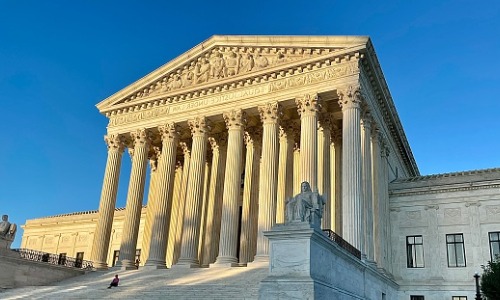A Code of Ethics for the Supreme Court? Transparency and Bias in the Judiciary
 Last month, the Senate Judiciary Committee approved legislation that would establish stronger ethics standards for the U.S. Supreme Court. It would mandate a new “code of conduct” for the highest court and a process for adjudicating violations modeled on the enforcement mechanisms that exist in lower courts. This code of conduct would require more transparency and accountability around potential conflicts of interest, gifts, and recusal decisions.
Last month, the Senate Judiciary Committee approved legislation that would establish stronger ethics standards for the U.S. Supreme Court. It would mandate a new “code of conduct” for the highest court and a process for adjudicating violations modeled on the enforcement mechanisms that exist in lower courts. This code of conduct would require more transparency and accountability around potential conflicts of interest, gifts, and recusal decisions.
The legislation comes on the heels of news about political donors funding luxury vacations for Supreme Court justices, which has generated increased scrutiny about activities of justices that could be construed as interfering with judicial independence and impartiality. The legislation is not expected to pass, but it is part of a broader public conversation about judicial ethics and public trust—or lack thereof—in the courts. This conversation impacts not only the perceived legitimacy of the Supreme Court but also public perception of the judiciary more broadly.
Since its inception in 2006, IAALS has been at the forefront of efforts to bolster confidence in the judiciary and to understand what impacts public trust in courts. Relevant to the current national conversation about ethics and impartiality, IAALS’ research in Cornerstones of State Judicial Selection and the O’Connor Judicial Selection Plan identified the following core, desirable attributes of individual judges and court systems, all of which are fundamental to ensuring public trust in the judiciary:
- Fairness and impartiality. Judges must not only avoid actual bias or impropriety but must also avoid the appearance of bias or impropriety, which undermines trust in their judicial independence.
- Ethics and integrity. Judges should be mindful that they represent the court at all times and should therefore act with integrity “both on and off the bench.” Judicial integrity includes, among other things, conducting oneself “in a way that engenders respect for the courts. (See IAALS’ An Uncommon Dialogue: What Do We Want in Our Judges & How Do We Get There?)
- Accountability and transparency. Judges should hold themselves accountable to the public.
- Trustworthiness. The legitimacy of court systems relies on public trust and confidence. Courts should address concerns that interfere with trust in the legal system.
This is not an exhaustive list of desirable attributes but reflects how deeply important it is that the public be able to trust the integrity and impartiality of its court systems and judicial officers. These public views about judicial behavior were underscored in the IAALS’ 2020 study Public Perspectives on Trust and Confidence in the Courts, which surveyed a diverse swath of the public about their trust in the civil legal system. Participants reflected that when they did not trust judges, it was often because of perceptions of bias, “specifically bias toward a particular political affiliation.” This concern about bias and politicization was true across the board for both elected and appointed judges and for courts at all levels, from local courts all the way up to the Supreme Court.
Judge Jeremy Fogel (Ret.), who sits on IAALS’ executive committee and leads the Berkeley Judicial Institute, has advocated for a code of ethics for the Supreme Court, though he believes such a code should come directly from the Court rather than Congress to avoid separation-of-powers issues. According to Judge Fogel, the issue is not that the justices are failing to make an effort to be ethical but rather that they “don’t show their work” and “[a]re not looking at the institutional damage that’s being done.”
To Judge Fogel, it is inevitable that members of the public will be unhappy about Supreme Court decisions on controversial cases, but the justices should not “give them fuel by being careless about [their] own conduct.” Equally as important as a code of conduct are impartial referees who can enforce it. For this, Judge Fogel recommends retired judges as “a place where [justices] can go to get an impartial opinion.”
Although there is much discussion and debate about the viability of a code of ethics to hold the Supreme Court accountable, one thing is exceedingly clear: transparency and avoiding the appearance of bias are fundamental to the legitimacy of courts at all levels. After all, the job of a judge is to ensure laws are applied to everyone equally and fairly. The public needs to be able to trust that judicial officers are administering consequences fairly and competently, but perceptions of bias, partiality, or partisanship in the highest court continue to undermine this trust.


